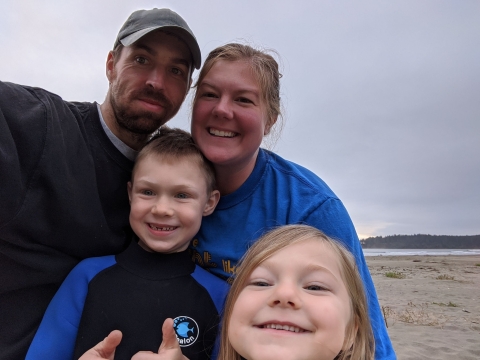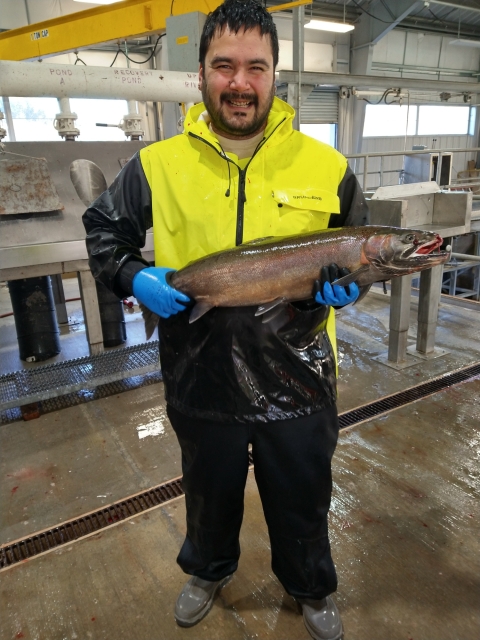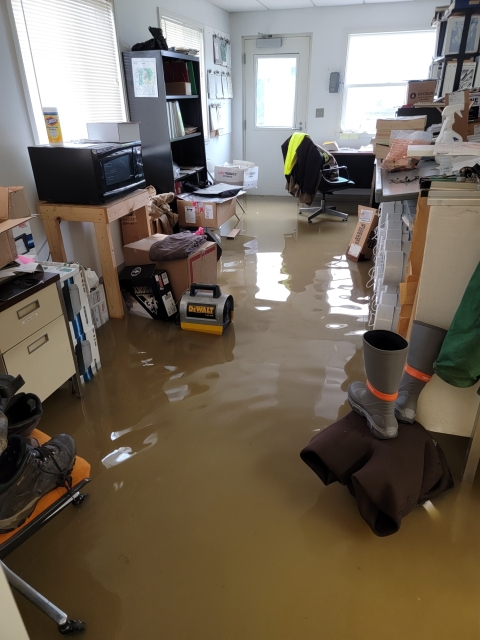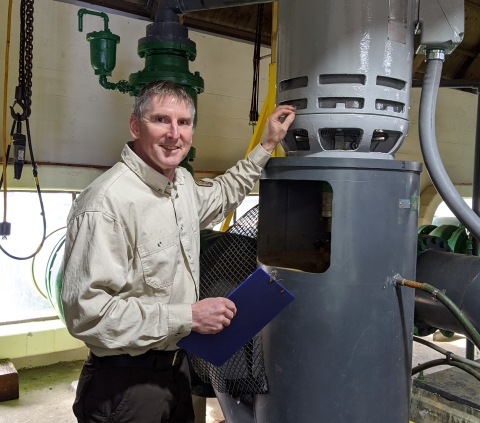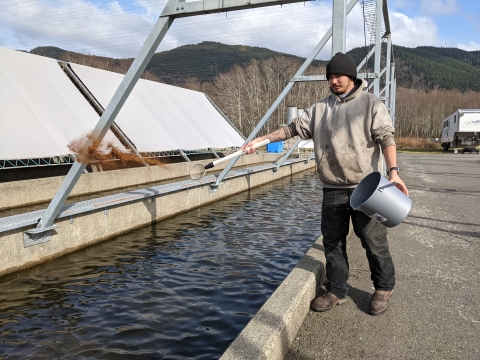Kristin Bates thought she knew what the future would bring when she started working at Makah National Fish Hatchery in December 2019.
As the hatchery’s new project leader, Bates expected they would do what they’ve always done – rear salmon and steelhead, collaborate with the Makah Tribe, engage with visitors, and continue to work as a dynamic team at a remote facility on the Olympic Peninsula in Washington.
All pretty normal stuff for a hatchery.
But normal was soon shattered as the COVID pandemic enveloped the hatchery, Makah Reservation, and whole world in March 2020. It led Bates and her team down a two-year path of isolation, extreme challenges, self-reliance and … kindness. Yes, kindness.
“It wasn’t easy being blindsided by COVID, but I do know how we made it through,” Bates said. “Instead of picking each other apart, acting selfishly and staying stagnant in what was going wrong, we as a staff decided to rise above. Who we were during the pandemic was probably not who we would be in normal times. So we gave each other a little extra space, patience and kindness.”
Making the Move
Bates, a native of Seward, Alaska, was no stranger to challenging work. She spent nine years working in the nonprofit hatchery industry in Alaska, managing three hatcheries and working with all species of Pacific salmon. Sometimes she would travel in small bush planes to drop off fish in high mountain lakes.
“I've known since my first day on the job that fish were my passion and I haven't looked back,” Bates said.
That piscine passion led her to Makah National Fish Hatchery in Neah Bay, Washington, for her first job with the U.S. Fish and Wildlife Service. Bates and her family – husband, Joe; two children, now 6-year-old Maleah and 9-year-old Caisen; and a pair of Australian shepherd dogs – were accustomed to sequestered locations and ready for a new adventure.
They eagerly welcomed the commonalities to southeast Alaska. There’s the rain and clouds for much of the year, along with stunning rocky beaches, vast wilderness, gorgeous snow-capped mountains, old-growth rainforests and, of course, the magnificent salmon.
The part that became all too evident shortly after her arrival was the remoteness of it all. Makah National Fish Hatchery is located on the Makah Reservation on the extreme northwest tip of the Olympic Peninsula. The reservation is the end of the line for traffic, with only one paved road connecting the reservation with the rest of North America.
Keep driving westbound through the reservation and you’ll end up at Cape Flattery or Cape Alava, the westernmost points in the Lower 48. Beyond that, there’s only the Pacific Ocean.
Bates embraced that seclusion.
“I've always lived on station and found it very rewarding to live in semi-remote areas where you really get to know the people you work with. My extended family includes my co-workers,” Bates said.
What she and the staff at Makah National Fish Hatchery couldn’t prepare for was the coming pandemic.
At Home on the Reservation
Makah National Fish Hatchery is a Tribal Trust facility that raises 2.3 million Chinook salmon, 400,000 coho salmon, and 180,000 steelhead for release into the local watershed. The hatchery has six full-time Service employees and two contract employees provided by the Makah Tribe.
Due to a dearth of available housing in the area, all staff either live in hatchery housing or on the reservation. Neah Bay is 80 miles and nearly two hours away from Port Angeles, Washington, which is the closest sizeable town.
When the COVID outbreak turned into a full-fledged pandemic in March 2020, the Makah Tribe closed the reservation to the public and installed a roadblock to keep nonresidents out of Neah Bay.
Overnight, her already difficult job became a whole lot more difficult, and the isolated fish hatchery became much, much more isolated.
“For two years we could not have family or friends visit,” Bates said. “Our newly hired deputy project leader had to wait close to six months before he could move to Neah Bay in 2020 due to safety protocols. Carolyn Erb, one of our fish culturists, couldn’t get her husband moved up because of restrictions getting onto the reservation. That all made Neah Bay even smaller and more closed off from the outside world.
“It increased the stress and sadness many were feeling.”
Thomas Johnson, a Makah Tribe member and fish culturist at the hatchery, felt that stress on a daily basis in both his work and personal life. He said work schedule changes weren't drastic, but sometimes they didn't mesh with his needed home life schedule.
“The pandemic was tough having three kids, and a wife who works as a Tribal employee. We both had to work around shifting schedules to deal with the pandemic,” Johnson said. “The safety requirements were tough too, having to wear masks inside while working with water and fish, and keep social distancing. People don't notice how often we interact with each other in really close quarters, let alone keeping six feet separation.”
As schools went remote and businesses expanded telework to enhance safety nationwide, federal hatchery employees still had to be at the hatchery daily. Growing salmon have to eat and need regular monitoring.
The routine of caring for fish – even when nothing else in the world was routine – helped Bates and the staff endure the pandemic.
“One of the best parts about being at a hatchery is the fish need us every day,” Bates said. “I couldn’t control everyone’s needs 100% of the time during these challenges, but I could control the health, growth and success of our fish programs.”
In addition to the day-to-day stress during COVID, a few extra-special circumstances made everything even more difficult.
- All the hatchery staff were in COVID quarantine at the same time due to potential exposure, except for one person. Steve Baum, one of the hatchery maintenance mechanics, came to the rescue and handled all the daily operations while his co-workers were unavailable.
- Leaving the reservation was difficult since it was shut down to the outside population. Staff and Tribal members could only leave for essential reasons such as shopping for food and doctor appointments. “At our checkpoint we would have to show proof of what we did, where we went, and provide grocery receipts in order to leave and come back without any repercussions,” Johnson said.
- Due to record-setting winter rainstorms, access to the outside world was further cut off when the highway leading to Neah Bay was closed due to flooding and blocked by a landslide.
- In that same flood event, the Tsoo-Yess River overflowed its banks and swept into hatchery buildings and threatened homes.
Bates found herself having to tell staff – and herself – that they were still doing great work, even though some projects seemed to just creep along due to pandemic limitations.
“We learned how to do more things at the hatchery, and how to be more self-sufficient,” Bates said. “Together, we fixed problems, cured fish, and two years later we’re ready to get back to normal. Instead of shouldering the burden of being alone, we all leaned on each other. We’re a team.”
Judy Gordon, assistant regional director for the Service’s Fish and Aquatic Conservation program in the Pacific Northwest, understands the challenges staff faced at Makah National Fish Hatchery and at other facilities across the region.
She started her career with the Service at the Fairbanks Fishery Resource Office in Alaska, conducting fisheries work in the near shore waters of the Arctic National Wildlife Refuge, and later as center director of Abernathy Fish Technology Center.
“Our field staff have my deepest respect,” Gordon said. “They worked so hard during the pandemic – day in and day out. They put themselves at greater risk of contracting COVID. Field staff at all our locations worked hard to find ways to keep staff as safe as possible, while still making sure we met our obligations to the Tribes and everyone in the Pacific Northwest. The Pacific Region Fish and Aquatic Conservation staff were absolutely amazing during the pandemic, and we owe them a huge debt of gratitude.”
Back to the New Normal
The Makah Reservation reopened to visitors on March 15, 2022, though the checkpoint stayed in place until April 2 to make sure visitors had their COVID vaccination cards. Bates has started seeing out-of-state license plates making their way to Olympic National Park’s Shi Shi Beach, the Makah Museum or Flattery Rocks National Wildlife Refuge.
Finally, family members are planning visits and staff are taking much-deserved vacations.
“We’re anxious, excited and so very happy to have made it through what seems to be the worst part of the pandemic,” Bates said, her fingers crossed for good luck. “I find peace in knowing we have brighter times ahead.”
Bates looks forward to a more normal future – a “new normal” as some people say. She hopes to build upon what the Makah National Fish Hatchery team learned during the pandemic.
“It’s important to note we made it through with an even stronger relationship with the community around us. Being closed for two years brought us closer with those who call Neah Bay home,” Bates said.
“We were able to build relationships, strengthen our Tribal Trust, and work together during these hard times. Living and working in a closed community meant everyone who was here, lived here together. This changed the way we all looked at each other, and I feel it is a bond that will last a very long time.”
